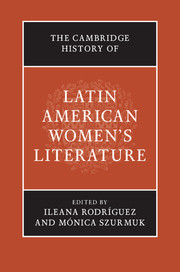Book contents
- The Cambridge History of Latin American Women’s Literature
- The Cambridge History of Latin American Women’s Literature
- Copyright page
- Dedication
- Contents
- Notes on Contributors
- Book part
- Introduction
- Part I Women in Ancient America: The Indigenous World
- Part II Women Writers in Creole Societies: Nation Building Projects
- 6 New Genres, New Explorations of Womanhood
- 7 Nineteenth-Century Brazilian Women Writers and Nation Building
- 8 Sense and Sensibility
- 9 The Lyrical World in the Nineteenth Century
- 10 “That Damned Mob of Scribbling Women”
- 11 Literature by Women in the Spanish Antilles (1800–1950)
- Part III Women Writers In-Between: Socialist, Modern, Developmentalists, and Liberal Democratic Ideals
- Part IV Women Writers in a One–World Global System: Neoliberalism, Sexuality, Subjectivity
- Bibliography
- Index
- References
6 - New Genres, New Explorations of Womanhood
Travel Writers, Journalists, and Working Women
from Part II - Women Writers in Creole Societies: Nation Building Projects
Published online by Cambridge University Press: 05 November 2015
- The Cambridge History of Latin American Women’s Literature
- The Cambridge History of Latin American Women’s Literature
- Copyright page
- Dedication
- Contents
- Notes on Contributors
- Book part
- Introduction
- Part I Women in Ancient America: The Indigenous World
- Part II Women Writers in Creole Societies: Nation Building Projects
- 6 New Genres, New Explorations of Womanhood
- 7 Nineteenth-Century Brazilian Women Writers and Nation Building
- 8 Sense and Sensibility
- 9 The Lyrical World in the Nineteenth Century
- 10 “That Damned Mob of Scribbling Women”
- 11 Literature by Women in the Spanish Antilles (1800–1950)
- Part III Women Writers In-Between: Socialist, Modern, Developmentalists, and Liberal Democratic Ideals
- Part IV Women Writers in a One–World Global System: Neoliberalism, Sexuality, Subjectivity
- Bibliography
- Index
- References
Summary
- Type
- Chapter
- Information
- The Cambridge History of Latin American Women's Literature , pp. 102 - 116Publisher: Cambridge University PressPrint publication year: 2015

